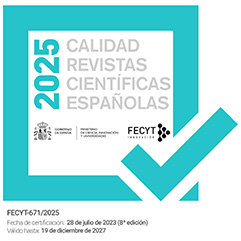Escaping the Ivory Tower: Legal Research on Human Rights from a Critical Perspective
DOI:
https://doi.org/10.17561/tahrj.n13.1Keywords:
legal method, legal research, interdisciplinarity, intersectoriality, activism, critical theory, human rights theoryAbstract
This article aims to address some of the criticisms that have been made of human rights research, especially of human rights research conducted by legal scholars. It argues that a conscious and critical approach to the limitations of the 'ivory tower' of legal scholarship on rights is becoming increasingly necessary in a research context marked by the convergence of multiple disciplines, the ever-growing contestation of human rights, and the complexity of the international regime for the protection of human rights. This article outlines three strategies that could be useful for legal scholars to escape from the ivory tower and make a significant contribution to multidisciplinary human rights studies.
Downloads
References
Andreassen, B., Sano, H.-O., McInerney-Lankford, S. (2017) Research Methods in Human Rights. A Handbook. Cheltenham: Edward Elgar Publishing. https://doi.org/10.4337/9781785367793
Bobbio, N. (1990) L’età dei diritti. Torino: Einaudi.
Brems, E. (2014) ‘Should Pluriform Human Rights Become One? Exploring the Benefits of Human Rights Integration’, European Journal of Human Rights, 4, pp. 447-470.
Brems, E. (2009) ‘Methods in Legal Human Rights Research’in Coomans, F., Grünfeld, F. and Kamminga M.T. (eds.) Methods of Human Rights Research. Antwerp: Intersentia, pp. 77-90.
Brems, E. and Ouald Chaib, S. (2018) Fragmentation and Integrationin Human Rights Law: Users’ Perspectives. Cheltenham: Edward Elgar Publishing. https://doi.org/10.4337/9781788113922
Bribosia, E. and Rorive, I. (2018) Human Rights Tectonics. Global Dynamics of Integration and Fragmentation. Cambridge: Intersentia. https://doi.org/10.1017/9781780688060
Calvo García, M. (1994) Los fundamentos del método jurídico: una revisión crítica. Madrid: Tecnos
Christiansen, C. O. and Jensen, S. L. B. (eds.) (2019) Histories of Global Inequality. Basingstoke: Palgrave Macmillan.
Coomans, F., Grünfeld, F. and Kamminga M.T. (2010) ‘Methods of Human Rights Research: A Primer’, Human Rights Quarterly, 32, pp. 180-187. https://doi.org/10.1007/978-3-030-19163-4_1
Coomans, F., Grünfeld, F. and Kamminga M.T. (eds.) (2009) Methods of Human Rights Research. Antwerp: Intersentia
Cruz Villalón, P. (2012) Rights in Europe – The Crowded House, King’s College London Working Paper in European Law 01/2012. Available at https://www.kcl.ac.uk/law/research/centres/european/research/CELWPEL012012FINAL.pdf
Dworkin, R. (1977) Taking Rights Seriously. Cambridge (Mass.): Harvard University Press
Feldman, D. (1989) ‘The nature of legal scholarship’, Modern LawReview, 52(4), pp. 498-517. https://doi.org/10.1111/j.1468-2230.1989.tb02611.x
Ferrajoli, L. (2001) Diritti fondamentali. Un dibattito teorico. Roma-Bari: Laterza
Follesdal, A. (2009) ‘Methods of Philosophical Research on Human Rights’ in Coomans, F., Grünfeld, F. and Kamminga M.T. (eds.) Methods of Human Rights Research. Antwerp: Intersentia, pp. 233-246
Gallie, W. B. (1956) ‘Essentially Contested Concepts’, Proceedings of the Aristotelian Society, 56 (1955 - 1956), pp. 167-198. https://doi.org/10.1093/aristotelian/56.1.167
Gerards, J. and Brems, E. (2017) Procedural Review in European Fundamental Rights Cases. Cambridge: Cambridge University Press
Hoover, J. (2012) ‘Human Rights Contested’, Journal of Intervention and Statebuilding, 6(2), pp.233-246. https://doi.org/10.1080/17502977.2012.672692
Jensen, S. L. B. (2017) ‘Putting to rest the Three Generations Theory of human rights’ Open Global Rights, 15 November. Available at: https://www.openglobalrights.org/putting-to-rest-the-three-generations-theory-of-human-rights/
Jensen, S. L. B. (2016) The Making of International Human Rights: The 1960s, Decolonization and theReconstruction of Global Values. Cambridge: Cambridge University Press. https://doi.org/10.1017/CBO9781316282571
Kennedy, D. (2005) The Dark Side of Virtue: Reassessing International Humanitarianism. Princeton: PrincetonUniversity Press. https://doi.org/10.1515/9781400840731
Klabbers, J. (2002) ‘Glorified Esperanto? Rethinking Human Rights’, Finnish Yearbook of International Law, 13, pp. 63-77
Langlois, A. (2012) ‘Human Rights in Crisis? A Critical Polemic Against Polemical Critics’, Journal of Human Rights, 11(4), pp. 558-570. https://doi.org/10.1080/14754835.2012.702473
Leeuw, F. L. (2015) ‘Empirical Legal Research: The Gap between Facts and Values and Legal Academic Training’, Utrecht Law Review, 11(2), pp. 18-33. https://doi.org/10.18352/ulr.315
Legrand, P. (2017) ‘Jameses at Play: A Tractation on the Comparison of Laws’, The American Journal of Comparative Law, 65(suppl. 1), pp. 1-136. https://doi.org/10.1093/ajcl/avx018
Macklem, P. (2015) The Sovereignty of Human Rights. Oxford - New York: Oxford University Press
Maritain, J. (1983) El hombre y el Estado. Madrid: Encuentro
Marx, A., Hachez, N., Meuwissen, K., Schmitt, P., Raube, K., Jaraczewski, J., Roszak, J., Lewis, T., Starl, K., MorondoTaramundi, D., Tuovinen, A.-K., and Weatherburn, A. (2015) ‘Localizing Fundamental Rights in the European Union: What is the Role of Local and Regional Authorities, and How to Strengthen It?’Journal of Human Rights Practice, 7(2), pp. 246–271. https://doi.org/10.1093/jhuman/huv004
McConnell, L. and Smith, R. (2018) Research Methods in Human Rights. London and New York: Routledge. https://doi.org/10.4324/9781315672632
Morondo Taramundi, D. (2014) ‘Anti-retórica y minimalismo de los derechos humanos’ in Fernández García, E. and Martínez García, J. I. (dirs.), Los derechos en el contexto ético, político y jurídico. Valencia: Tirant Lo Blanch, pp. 121-147
O’Cinneide, C. (2009) Human Rights and within Multi-layered Systems of Constitutional Governance: Rights Cosmopolitanism and Domestic Particularism in Tension. University College Dublin Law Research Paper 12/2009. Available at https://ssrn.com/abstract=1370264
Smits, J. (2009) ‘Redefining Normative Legal Science: Towards an Argumentative Discipline’ in Coomans, F., Grünfeld, F. and KammingaM.T. (eds.) Methods of Human Rights Research. Antwerp: Intersentia, pp. 45-57
Taekema, S. and van Klink, B. (2011) ‘Editorial. Legal Methods under Discussion’. Recht en Methode, 1(1), pp. 11-12. https://doi.org/10.5553/ReM/221225082011001001002
Van Dijck, G., Sverdlov, S. and Buck, G. (2018) ‘Empirical Legal Research in Europe: Prevalence, Obstacles, and Interventions’, Erasmus LawReview 2 [online]. Available at http://www.erasmuslawreview.nl/tijdschrift/ELR/2018/2/ELR-D-17-00020.pdf (accessed: 15 July 2019)
Van Gestel, R., Micklitz, H.-W. (2011) Revitalizing Doctrinal Legal Research in Europe: What about Methodology? EUI Working Papers LAW No. 2011/05. Available at https://cadmus.eui.eu/handle/1814/16825
Van Gestel, R., Micklitz, H.-W., Maduro, M. P. (2012) Methodology in the New Legal World. EUI Working Papers LAW No. 2012/13. Available at https://ssrn.com/abstract=2069872
White, R.C.A., and Boussiakou, I. (2009) ‘Separate opinions in the European Court of Human Rights’, Human Rights Law Review, 9(1), pp. 37–60 https://doi.org/10.1093/hrlr/ngn033




























